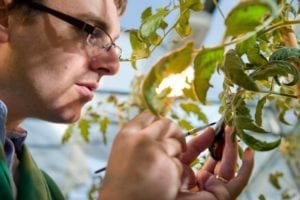
Meet Martin de Vos, PhD
 Martin de Vos is a recipient of BTI’s 2019 Early Career Award. After obtaining his PhD in Plant Pathology at Utrecht University in The Netherlands in 2005, Martin joined BTI in Georg Jander’s lab, first as a postdoctoral associate from 2005-2008, and then as a research associate from 2008-2010.
Martin de Vos is a recipient of BTI’s 2019 Early Career Award. After obtaining his PhD in Plant Pathology at Utrecht University in The Netherlands in 2005, Martin joined BTI in Georg Jander’s lab, first as a postdoctoral associate from 2005-2008, and then as a research associate from 2008-2010.
In Dr. Jander’s own words:
“Martin De Vos is the most productive postdoc who has ever worked in my lab. According to PubMed, Martin and I are co-authors on 18 publications from the time that he was here at BTI. Martin has a unique combination of skills: he has excellent research ideas, works hard, is socially interactive, and is outstanding at motivating students, technicians, and others who are working under his supervision.
After leaving my lab, Martin went to work at Keygene NV, a company that applies molecular approaches to vegetable breeding. KeyGene is owned by a consortium of four vegetable seed companies (Enza Zaden, Rijk Zwaan, Takii Seeds and Limagrain Vegetable Seeds), which together supply 35 % of the world’s vegetable seed market.
At KeyGene, Martin is considered a bit of a guru and a definite go-to person for research expertise in the area of trait biology. He is now one of the more prominent research leaders at KeyGene, running a group of 15 scientists (technicians, researchers and postdocs) who are using molecular genetic approaches to find genes that can be used to improve vegetable crops. The main focus of Martin’s group is on biotic stress (resistance to pathogens, nematodes and insects). All projects in his team follow the principle of screen, understand and design.
Early in his career at KeyGene, Martin identified whitefly resistance genes in wild relatives of tomato. A more recent and notable achievement is the cloning of a number of genes that reduce aphid feeding in crops. Currently, aphid resistance in commercial lettuce is based on a single resistance gene that was introduced more than 20 years ago. New clones of the lettuce aphid have evolved to break this resistance gene. Through Martin’s work, a new resistance gene has been found in wild lettuce. This is a notable achievement, not only because of its direct practical applications, but also because, as far as I know, it is only the third R gene for insect resistance that has been cloned from any plant species.
The past 5 year, work from Martin’s team focused on S-gene approaches, which, among others, have provided breeders with novel resistances to whitefly-transmitted viral diseases in crops. More recently, his team has ventured into the topic of biologicals, which he is confident will have a big impact on agriculture. In particular, KeyGene wishes to understand plant genetic loci that are involved in the recruitment of beneficial microbes that assist in plant protection to biotic and abiotic stresses.”
